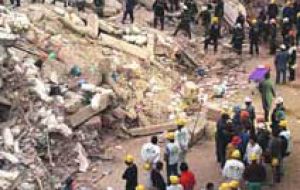MercoPress. South Atlantic News Agency
Interpol warrants for Iranian officials linked to Bs As bombing
 Jewish community center in Buenos Aires on July 18, 1994.
Jewish community center in Buenos Aires on July 18, 1994. Interpol plans to issue international requests as of March 31 for the arrest of five prominent Iranians and a Lebanese militant in connection with the 1994 bombing of a Jewish cultural centre in Argentina, the international police agency announced this week
Interpol's executive committee unanimously approved the decision in Lyon, France, after hearing the arguments from Argentine prosecutor Alberto Nisman and from an Iran delegation contrary to the arrest requests. The arrest warrants include the former Cultural attaché of the Iranian embassy in Buenos Aires Mohsen Rabbani; third secretary Ahmad Asghari; former Iranian Intelligence chief Ali Fallahijan and the former commanders of the Revolutionary Guard Mohsen Rezai and Ahmad Vahidi and Lebanese militant, Imad Mughniyah. But Interpol turned down Argentina's request for help in the arrests of three other former top Iranians, including former President Hashemi Rafsanjani. Argentina requested help from Interpol after Argentine Judge Rodolfo Canicoba Corral said last year he was seeking the detentions of Rafsanjani and eight others. Argentine prosecutors have alleged that the attack was orchestrated by leaders of the Iranian government and entrusted to the Lebanon-based militant group Hezbollah. Iran has denied any involvement in the bombing and said it would oppose any attempt to detain Iranian citizens. Both countries are members of Lyon, France-based Interpol. Interpol said it would issue "red notices" for the Iranians on March 31 unless either Iran or Argentina appeals the decision. In that case, none would be issued, and the matter could go before Interpol's general assembly in November. A "red notice" is an Interpol request that a wanted person be arrested with a view to extradition. While the measure cannot force countries to arrest or extradite suspects, people with red-notice status appear on Interpol's equivalent of a most-wanted list. According to INTERPOL regulations controversial issues involving two member countries must be addressed by the executive committee, made up of thirteen members. In this case it was presided by South Africa with representatives from United States, Germany, Russia, India, Chile, Singapore, Italy, Algiers, Korea, Spain Morocco and Brazil. Eighty-five people were killed and 200 wounded when a van packed with explosives blew up outside the seven-story Jewish community center in Buenos Aires on July 18, 1994.




Top Comments
Disclaimer & comment rulesCommenting for this story is now closed.
If you have a Facebook account, become a fan and comment on our Facebook Page!